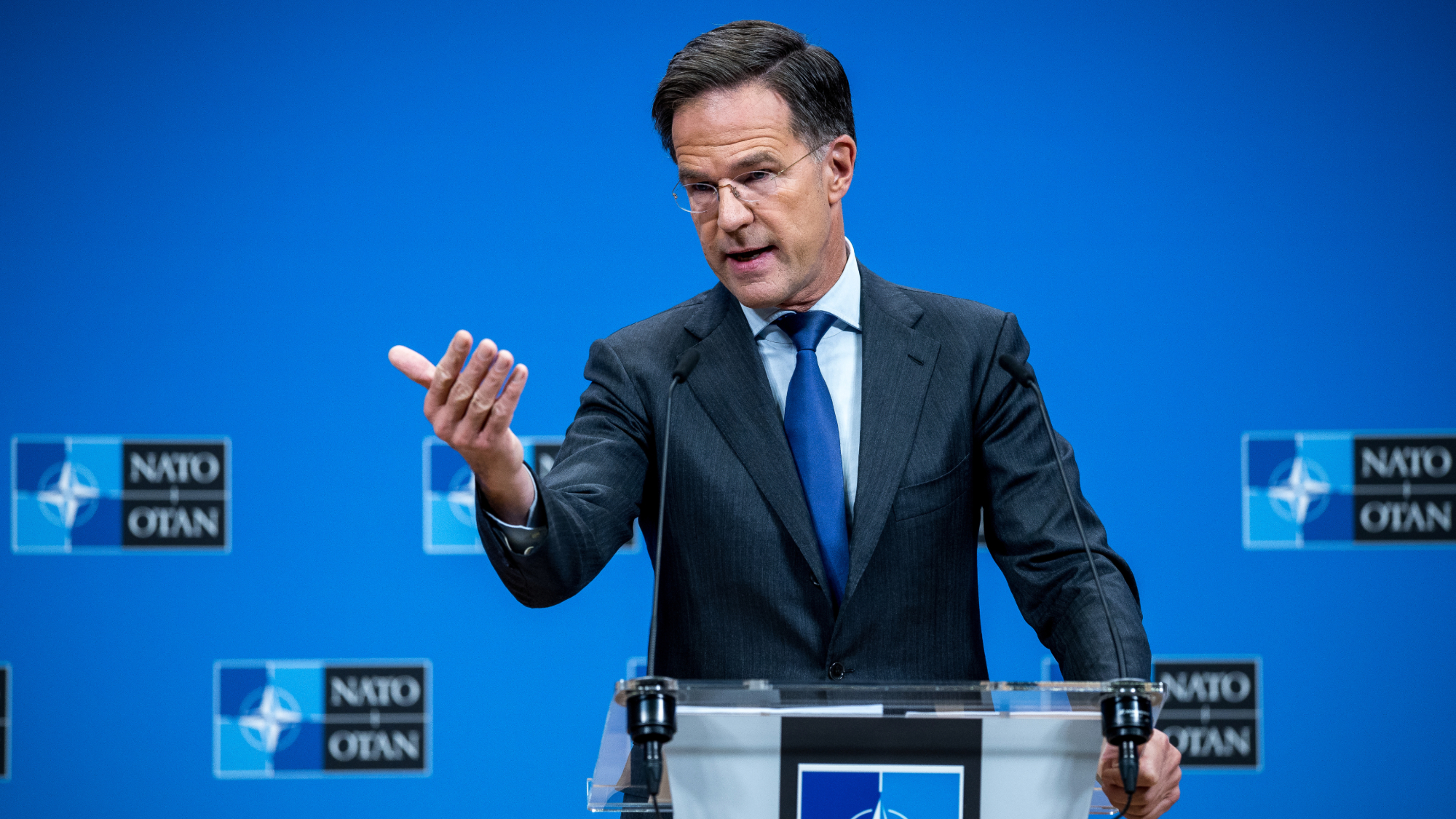NATO chief urges Europe to arm against Russia
Mark Rutte said Putin wants to 'wipe Ukraine off the map' and might come for other parts of Europe next


A free daily email with the biggest news stories of the day – and the best features from TheWeek.com
You are now subscribed
Your newsletter sign-up was successful
What happened
New NATO Secretary-General Mark Rutte warned Europe Thursday that Russia's Vladimir Putin wants to "wipe Ukraine off the map" and might come for other parts of Europe next. "It is time to shift to a wartime mindset," Rutte said at the Carnegie Europe think tank in Brussels, in his first major speech since taking NATO's helm in October.
Who said what
Putin is "preparing for long-term confrontation" and "trying to crush our freedom and way of life," Rutte said. Russia is spending 7-8% of GDP on defense, he said, and European nations will have to spend "a lot more" than the NATO target of 2% to blunt Putin's expansionist aggression.
Putin, meanwhile, was "scrambling to save face" after his "humiliating loss" of influence in Syria, The Washington Post said. Russia's failure to save ally Bashar al-Assad's regime dealt a "stunning blow" to Putin's key goal of "forging Russia into a great world power competing globally with the United States."
The Week
Escape your echo chamber. Get the facts behind the news, plus analysis from multiple perspectives.

Sign up for The Week's Free Newsletters
From our morning news briefing to a weekly Good News Newsletter, get the best of The Week delivered directly to your inbox.
From our morning news briefing to a weekly Good News Newsletter, get the best of The Week delivered directly to your inbox.
What next?
President-elect Donald Trump reiterated Sunday that he would "absolutely" consider pulling the U.S. from NATO if America's military allies were not "paying their bills" or "treating us fairly." Rutte's reputation as a "Trump whisperer" is "a very big reason he was chosen as NATO secretary general," the BBC said.
A free daily email with the biggest news stories of the day – and the best features from TheWeek.com
Peter has worked as a news and culture writer and editor at The Week since the site's launch in 2008. He covers politics, world affairs, religion and cultural currents. His journalism career began as a copy editor at a financial newswire and has included editorial positions at The New York Times Magazine, Facts on File, and Oregon State University.
-
 How the FCC’s ‘equal time’ rule works
How the FCC’s ‘equal time’ rule worksIn the Spotlight The law is at the heart of the Colbert-CBS conflict
-
 What is the endgame in the DHS shutdown?
What is the endgame in the DHS shutdown?Today’s Big Question Democrats want to rein in ICE’s immigration crackdown
-
 ‘Poor time management isn’t just an inconvenience’
‘Poor time management isn’t just an inconvenience’Instant Opinion Opinion, comment and editorials of the day
-
 Putin’s shadow war
Putin’s shadow warFeature The Kremlin is waging a campaign of sabotage and subversion against Ukraine’s allies in the West
-
 Rubio boosts Orbán ahead of Hungary election
Rubio boosts Orbán ahead of Hungary electionSpeed Read Far-right nationalist Prime Minister Viktor Orbán is facing a tough re-election fight after many years in power
-
 Alexei Navalny and Russia’s history of poisonings
Alexei Navalny and Russia’s history of poisoningsThe Explainer ‘Precise’ and ‘deniable’, the Kremlin’s use of poison to silence critics has become a ’geopolitical signature flourish’
-
 Key Bangladesh election returns old guard to power
Key Bangladesh election returns old guard to powerSpeed Read The Bangladesh Nationalist Party claimed a decisive victory
-
 US, Russia restart military dialogue as treaty ends
US, Russia restart military dialogue as treaty endsSpeed Read New START was the last remaining nuclear arms treaty between the countries
-
 What happens now that the US-Russia nuclear treaty is expiring?
What happens now that the US-Russia nuclear treaty is expiring?TODAY’S BIG QUESTION Weapons experts worry that the end of the New START treaty marks the beginning of a 21st-century atomic arms race
-
 EU and India clinch trade pact amid US tariff war
EU and India clinch trade pact amid US tariff warSpeed Read The agreement will slash tariffs on most goods over the next decade
-
 Ukraine, US and Russia: do rare trilateral talks mean peace is possible?
Ukraine, US and Russia: do rare trilateral talks mean peace is possible?Rush to meet signals potential agreement but scepticism of Russian motives remain
